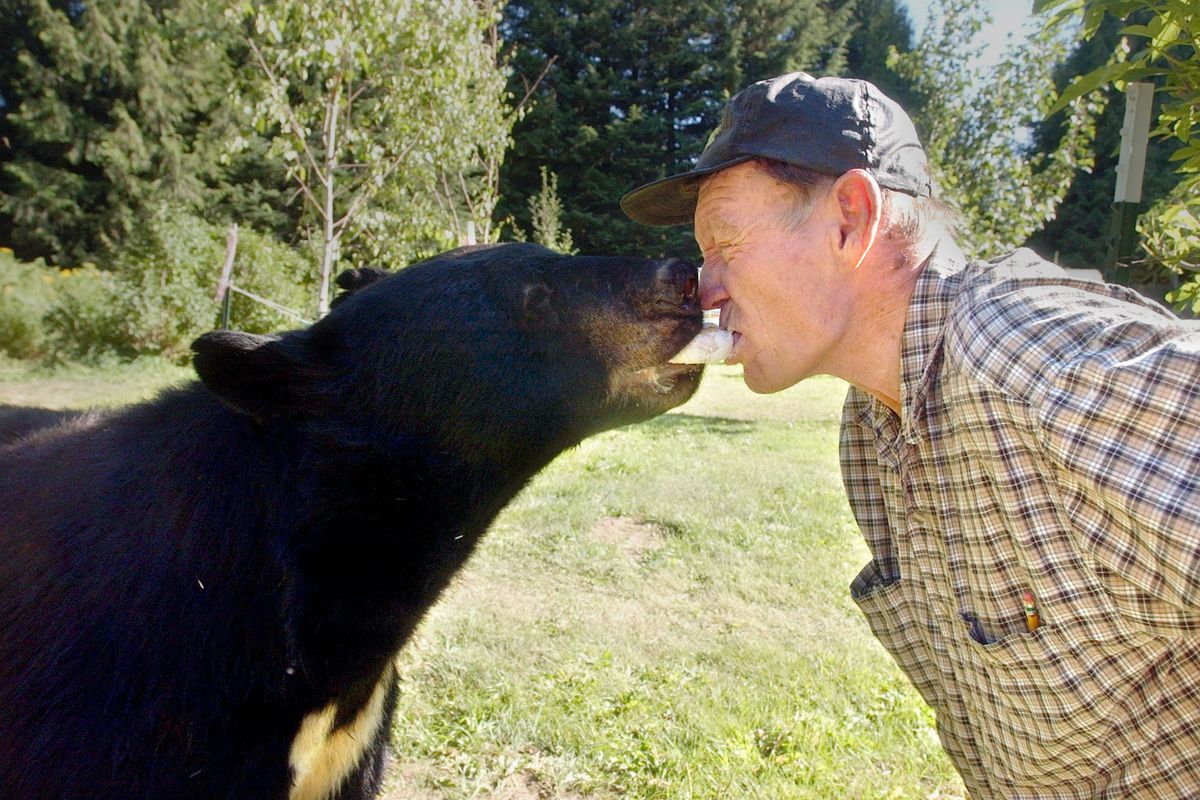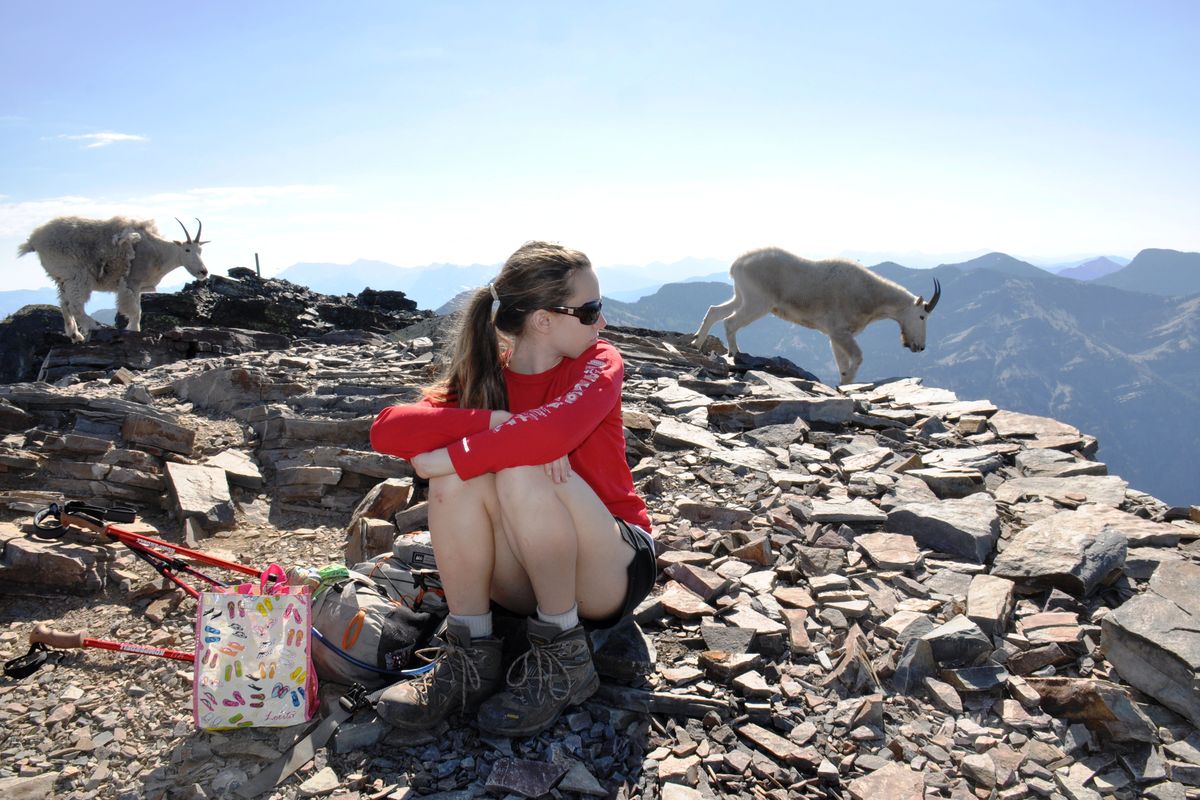Giving wild critters handouts can have unforseen consequences
Mountain goats approach hikers on the summit of Scotchman Peak, apparently looking for food or salty packs or skin to lick. (Rich Landers)Buy a print of this photo
Two Seattle women had all night near a wilderness lake to contemplate the consequences of wildlife being habituated to humans.
Allyson Kemp, 42, and Sara Esrick, 44, had driven the rough access road from Salmon la Sac last month and hiked in 8 miles into the Alpine Lakes Wilderness, including a rugged route up to Robin Lakes, elevation 6,200 feet.
With 20 years of backpacking experience, they were at ease in the wilderness – until a mountain goat wouldn’t leave them alone at their campsite.
They had pitched their tent and climbed up into some rocks to cook dinner.
“I’ve been around mountain goats many times before and didn’t have issues with them,” Kemp said.
They’d seen the goat tune into them from a long distance away and they enjoyed watching it coming toward them.
“We knew that goats could be pests, so we kept our food and stuff near us so it wouldn’t chew on anything,” she said.
When the goat came too close for comfort, Kemp started whirling her food bag over her head, yelling at it and making short charges at it as she tried to scare it away.
“He was not dissuaded,” she said.
They consolidated their food and sweaty clothing and resorted to throwing rocks at the persistent goat.
“We hit him a few times, too, but he just kept coming back closer, especially if you rustled a plastic bag.”
As darkness fell, the women did not feel safe getting into their tent with the goat still parading around, so they decided to retreat.
“I know it’s not proper etiquette, but we threw out some string cheese to distract him so we could stuff everything into our backpacks and high-tail it out of there,” she said.
But the goat soon was bugging them again as they used headlamps to follow cairns down to Tuck Lake.
“There was nowhere to hide, so we climbed up on a rock where we felt we had a better chance of making a stand if it came up at us.”
Despite their yelling and rock throwing, the goat wouldn’t leave. “He was circling us when we called 911 at 10:30 p.m.,” she said.
The call was patched through to Capt. Chris Anderson of the Washington Department of Fish and Wildlife enforcement division in Ephrata. “I wasn’t going to be able to get in there before morning no matter what, so I told them to wrap up in their sleeping bags and stay on the rock,” he said.
An officer was alerted, but the women called about 4:30 a.m. and said the goat had left and they were making a break. They never saw the goat again, but they said the incident was among the most unsettling in their years of wilderness backpacking.
“We all know about the fatality in Olympic National Park, so we can’t take these incidents lightly,” Anderson said, referring to the 2010 death of a hiker who bled to death after being gored in the thigh by an aggressive billy.
Rangers killed the goat, but the man’s family claimed the goat had been harassing hikers for years and the National Park Service was negligent. A judge dismissed their $10 million lawsuit.
Anderson said the Robin Lake goat likely associated humans as a source of snacks, sweat and urine that satisfies the critter’s craving for salt.
“Campers are somewhat at the mercy of people who came before them when it comes to wildlife encounters,” he said.
Incidents involving wildlife that have developed a taste for human food sources range from raccoons to grizzly bears, usually with the wildlife being the ultimate victim.
Glacier National Park rangers in mid-July captured and euthanized a black bear that had been frequenting the Fish Creek Campground near Lake MacDonald.
That same week, a black bear that broke into two occupied tents at a Forest Service campground south of Red Lodge, Mont., was killed by state officers.
Montana Fish Wildlife and Parks officials killed five black bears in early July and shut down river trips and camping on the Smith River for five days after emboldened bears began frequenting the coveted float-in campsites. The agency’s website lists more than two dozen other incidents in which bears had to be trapped and relocated or euthanized following encounters with people this year.
State officials also had to destroy five black bears along the Smith River in 2008 because they had became food-conditioned and were aggressive to campers after being hand-fed by an area landowner-outfitter.
Gary Anderson, 71, of the Heaven on Earth Ranch on the Smith, paid a $135 fine.
“Feeding wildlife can lead animals to associate humans with a food reward,” Bryan Golie, state game warden. “That can lead to problems later and ultimately mean the animal has to be put down. It’s also illegal.”
“We’re working on rules and a process to deal with this issue before the next permit season on the Smith,” said Ron Aasheim, FWP spokesman. “We’re well aware we’ve got to get a handle on this problem.”
North Idaho hikers regularly encounter mountain goats near the top of Scotchman Peak northeast of Lake Pend Oreille. Most of the encounters during the 7-mile round-trip hike are pleasant, but people have posted videos of their parties feeding the goats on YouTube.
One hiker posted on Facebook that he and a friend had to throw “a barrage of rocks” at one billy with a shoulder injury that was being aggressive to them.
Another hiker said a goat came up and began licking the sweat off his girlfriends arm, but then it would not stop until others intervened and chased it off.
“We fear for the mountain goats if they continue to be habituated,” said Phil Hough of the Friends of the Scotchman Peaks Wilderness. Two years ago, the group began posting educational signs at the trailhead asking hikers to avoid attracting the goats to the trail or summit with food or urine.
Officials in Olympic National Park as well as the Okanogan-Wenatchee national forests have been trying to educate hikers about the consequences of feeding mountain goats and other wildlife. They also have been requesting hikers to get off of trails by at least 200 feet and away from campsites when they urinate.
Mountain goats as well as deer can become addicted to human urine as an easy source of salt, they say.
Cle Elum Ranger District staffers say they received a report from Kemp and Esrick regarding their tense mountain goat encounter at Robin Lake. Scattered reports of aggressive mountain goats have been received in past years, but no more reports have been made from the Tuck-Robin Lakes area this season, they said.
“We reported to the Forest Service because we wanted other hikers to be aware,” Kemp said.
Esrick, who’s hiked much of the Pacific Crest Trail solo, said she’s never had a night that scary in the wilderness.
“Why don’t you leave us alone?” I kept asking. “He was totally stalking us. It was a long night.”


